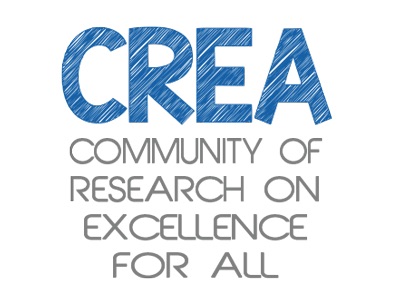Básica
Aubert, A., Flecha, A., García, C., Flecha, R., & Racionero, S. (2016).
Aprendizagem dialógica na Sociedade da Informação.
EdUFSCar.
Flecha, R. (Ed.). (2015).
Successful educational actions for inclusion and social cohesion in Europe.
Springer.
Racionero, S., Ortega, S., García, R. & Flecha, R. (2012).
Aprendiendo contigo.
Barcelona: Hipatia Editorial.
ISBN: 978-84-938226-3-7.
Aubert, A., Duque, E., Fisas, M. & Valls, R. (2004).
Dialogar y transformar. Pedagogía crítica del siglo XXI.
Barcelona: Graó.
Gómez, J. (2004).
El amor en la sociedad del riesgo.
Barcelona: El Roure Ciencia.
Elboj, C., Puigdellívol, I., Soler, M., & Valls, R. (2002).
Comunidades de aprendizaje. Transformar la educación.
Barcelona: Graó.
Flecha, R. (1997).
Compartiendo palabras: el aprendizaje de las personas adultas a través del diálogo.
Barcelona: Paidós.
Complementares
Rodríguez, J.A., Condom-Bosch, J.L., Ruíz, L., & Oliver, E. (2020).
On the Shoulders of Giants: Benefits of participating in a Dialogic Professional Development Program fon in-service teachers.
Frontiers in Psychology, 1-26.
DOI:10.3389/fpsyg.2020.00005.
León-Jiménez, S., Villarejo-Carballido, B., López de Aguileta, G., Puigvert, L. (2020).
Propelling Children’s Empathy and Friendship.
Sustainability, 12(18), 7288.
DOI:10.3390/su12187288.
Roca, E., Melgar, P., Gairal-Casadó, R., & Pulido, M. (2020).
Schools That ‘Open Doors’ to Prevent Child Abuse in Confinement by COVID-19.
Sustainability, 12(11), 4685.
DOI:10.3390/su12114685.
Villarejo-Carballido, B., Pulido, C.M., de Botton, L., Serradell, O. (2019).
Dialogic Model of Prevention and Resolution of Conflicts: Evidence of the Success of Cyberbullying Prevention in a Primary School in Catalonia.
International Journal of Environmental Research and Public Health, 16, 918.
DOI:10.3390/ijerph16060918.
Renta, A. I., Aubert, A., & Tierno, J.M. (2019).
Influencia de la formación de familiares en la motivación del alumnado en riesgo de exclusión social.
Revista Mexicana de Investigación Educativa, 24(81), 481-505.
Girbés-Peco, S., Gairal-Casadó, R., & Torrego-Egido, L. (2019).
Participación de mujeres gitanas y marroquíes en la formación de familiares: beneficios educativos y psicosociales.
Cultura y Educación.
DOI:10.1080/11356405.2019.1656487.
Puigvert, L., Flecha Garcia, R., Racionero, S., & Sordé-Martí, T. (2019).
Socioneruroscience and its contributions to conscious versus unconscious volition and control. The case of gender violence prevention.
AIMS Neuroscience, 6(3). 204-218.
DOI:10.3934/Neuroscience.2019.3.204.
Garcia Yeste, C., Morlà, T., & Ionescu, V. (2018).
Dreams of Higher Education in the Mediterrani School Through Family Education.
Frontiers in Education, 3(79).
DOI:10.3389/feduc.2018.00079.
García-Carrión, R., Molina-Luque, F., & Roldán, S. M. (2018).
How do vulnerable youth complete secondary education? The key role of families and the community.
Journal of Youth Studies, 27(14), 701-716.
DOI:10.1080/13676261.2017.1406660.
Villardón-Gallego, L., García-Carrión, R., Yáñez-Marquina, L., & Estévez, A. (2018).
Impact of the Interactive Learning Environments in Children’s Prosocial Behavior.
Sustainability, 10.
DOI:10.3390/su10072138.
Valero, D., Redondo-Sama, G. & Elboj, C. (2018).
Interactive groups for immigrant students: a factor for success in the path of immigrant students.
International Journal of Inclusive Education, 22(7), 787-802.
DOI:10.1080/13603116.2017.1408712.
García-Carrión, R., Molina, S. & Roca, E. (2018).
Interactive Learning Environments for the Educational Improvement of Students With Disabilities in Special Schools. Frontiers in Psychology.
9.
DOI:10.3389/fpsyg.2018.01744.
Girbés-Peco, S., Renta, A.I., De Botton, L., & Álvarez, P. (2018).
The Montserrat’s neighbourhood dream: involving Moroccan residents in a school-based community development process in urban Spain.
Social & Cultural Geography (Published online).
DOI:10.1080/14649365.2018.1509112.
Garcia-Carrion, R., Gomez, A., Molina, S., & Ionescu, V. (2017).
Teacher Education in Schools as Learning Communities: Transforming High-Poverty Schools through Dialogic Learning.
Australian Journal of Teacher Education, 42(4).
DOI:10.14221/ajte.2017v42n4.4.
Carrillo, A., Girbés-Peco, S., De Botton, L., & Valls-Carol, R. (2017).
The role of communicative acts in the Dream process: engaging Moroccan migrants in a community development initiative in urban Spain.
Community Development Journal, 1-18.
DOI:10.1093/cdj/bsx049.
Molina, S. (2015).
Alba, a Girl Who Successfully Overcomes Barriers of Intellectual Disability Through Dialogic Literary Gatherings.
Qualitative Inquiry, 21(10), 927–933.
DOI:10.1177/1077800415611690.
Girbés-Peco, S., Macías, F., & Álvarez, P. (2015).
De la Escuela Gueto a una Comunidad de Aprendizaje: Un Estudio de Caso sobre la Superación de la Pobreza a Través de una Educación de Éxito.
International and Multidisciplinary Journal of Social Sciences, 4(1), 88–116.
DOI:10.17583/rimcis.2015.04.
Melgar, P. (2015).
Interactive groups in early childhood education: First step for educational success.
Intangible Capital, 11, 316-332.
DOI:10.3926/ic.658.
Molina, S. (2015).
La inclusión del alumnado con necesidades educativas especiales en Comunidades de Aprendizaje.
Intangible Capital, 11(3), 372-392.
DOI:10.3926/ic.642.
García-Carrión, R., & Díez-Palomar, J. (2015).
Learning communities: Pathways for educational success and social transformation through interactive groups in mathematics.
European Educational Research Journal, 14(2), 151–166.
DOI:10.1177/1474904115571793.
Melgar, P. (2015).
Luis, From Ex-Prisoner to Neighborhood Representative and Interlocutor With Public Administrations.
Qualitative Inquiry, 21(10), 872–878.
DOI: 10.1177/1077800415611694.
Ramis, M. (2015).
Pluralidad e igualdad en las comunidades de aprendizaje.
Intangible Capital, 11(3), 293-315.
DOI:10.3926/ic.580.
Ruiz, L. (2015).
Transforming the Vision of Classic Literature.
Qualitative Inquiry, 21(10), 899–905.
DOI:10.1177/1077800415614029.
Díez-Palomar, J., & Cabré, J. (2015).
Using dialogic talk to teach mathematics: the case of interactive groups.
ZDM Mathematics Education, 47(7), 1299–1312.
DOI:10.1007/s11858-015-0728-x.
García-Carrión, R. (2015).
What the Dialogic Literary Gatherings Did for Me.
Qualitative Inquiry, 21(10), 913–919.
DOI:10.1177/1077800415614305.
Gómez, A., Munte, A., & Sorde, T. (2014).
Transforming schools through minority males’ participation: Overcoming cultural stereotypes and preventing violence.
Journal of Interpersonal Violence, 29(11), 2002–2020,.
DOI:10.1177/0886260513515949.
Valls, R., & Kyriakides, L. (2013).
The power of interactive groups: how diversity of adults volunteering in classroom groups can promote inclusion and success for children of vulnerable minority ethnic populations.
Cambridge Journal of Education, 43(1), 17–33.
DOI:10.1080/0305764X.2012.749213.
Flecha, R., & Soler, M. (2013).
Turning difficulties into possibilities: engaging Roma families and students in school through dialogic learning.
Cambridge Journal of Education, 43(4), 451–465.
DOI:10.1080/0305764X.2013.819068.



